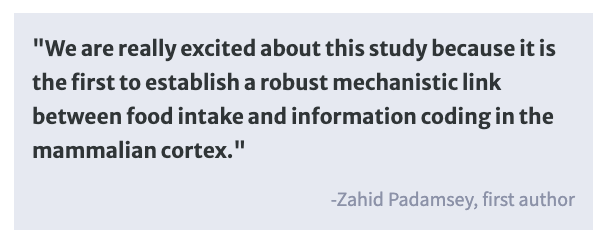The Brain Adjusts Coding Precision To Save Energy
Post by Leanna Kalinowski
The takeaway
During times in which access to food is limited, the brain must conserve energy by reducing information processing. Neurons in the visual cortex conserve energy following food restriction by decreasing the coding precision of visual information.
What's the science?
The brain uses considerable energy when processing information from the world around us. In general, it consumes 20% of the body’s total caloric intake while only constituting around 2% of the body’s total mass. Given the high energy cost of neural processing, coupled with limited energy resources, the brain is thought to have evolved an energy-efficient strategy that maximizes the amount of information transmission per unit of energy used (i.e., ATP, the main source of energy for cells). During times of food scarcity, it is believed that neuronal networks in the brain conserve energy by reducing information processing. While there is evidence that suggests this is likely the case in invertebrates, it is unclear how the mammalian brain regulates information processing and energy use when access to food is limited. This week in Neuron, Padamsey and colleagues used the mouse primary visual cortex as a model system to examine how food restriction affects information processing and energy consumption in neuronal networks.
How did they do it?
Adult male mice were separated into one of two groups: a control group, where they were given unrestricted access to food, and a food-restricted group, where they were given limited access to food that led to a 15% reduction in body weight over 2-3 weeks. First, the researchers examined ATP use in the primary visual cortex by taking whole-cell voltage-clamp recordings of neurons in this brain region while exposing mice to videos of the outdoors (i.e., a natural setting). These recordings measured excitatory currents, (indicative of neural activity in the visual cortex), which pose the greatest ATP burden on the cortex. Next, the researchers measured visual cortex activity using two-photon calcium imaging during a coding precision task. In this environment, mice were shown videos of the outdoors or their home cage, and the researchers applied a maximum likelihood decoder to record neuronal activity to determine how well distinct visual stimuli were encoded in the brain of food-restricted mice. The authors also tested visual discrimination behaviourally using a two-alternative, forced-choice task. Finally, the researchers examined the role of the hormone leptin in information processing and energy use. They did this by (1) measuring serum leptin levels in control vs food-restricted mice and (2) delivering synthetic leptin for 10 days and re-assessing the coding precision task.
What did they find?
First, the researchers found that mouse visual cortex neurons save ATP use by decreasing excitatory postsynaptic currents through a reduction in AMPA receptor conductance. The ATP use associated with these currents was reduced by 29% in food-restricted mice compared to controls, while the rate of neuronal spiking remained similar between the two groups owing to compensatory changes in neuronal input resistance and resting potential. Next, they found that ATP savings were accompanied by a reduction in decoding accuracy and visual discrimination ability in the food-restricted mice, decoding of similar scenes from the same environment was impaired in the food-restricted mice. Taken together, these results demonstrate that when food is scarce, neurons reduce ATP utilization on synaptic currents at the expense of coding precision. Finally, they found that this reduction in coding precision was associated with reduced levels of the hormone leptin, and was reversed following administration of synthetic leptin.
What's the impact?
This study is the first to show that, in times of food scarcity, coding precision in the mammalian visual cortex is reduced in order to save energy. This suggests that the brain is able to dynamically adapt coding precision and energy use in a context-dependent manner, which is overall beneficial to survival. Further work is needed to understand the full impact of food restriction on total brain energy use and information processing, particularly in other cell types and brain regions.


